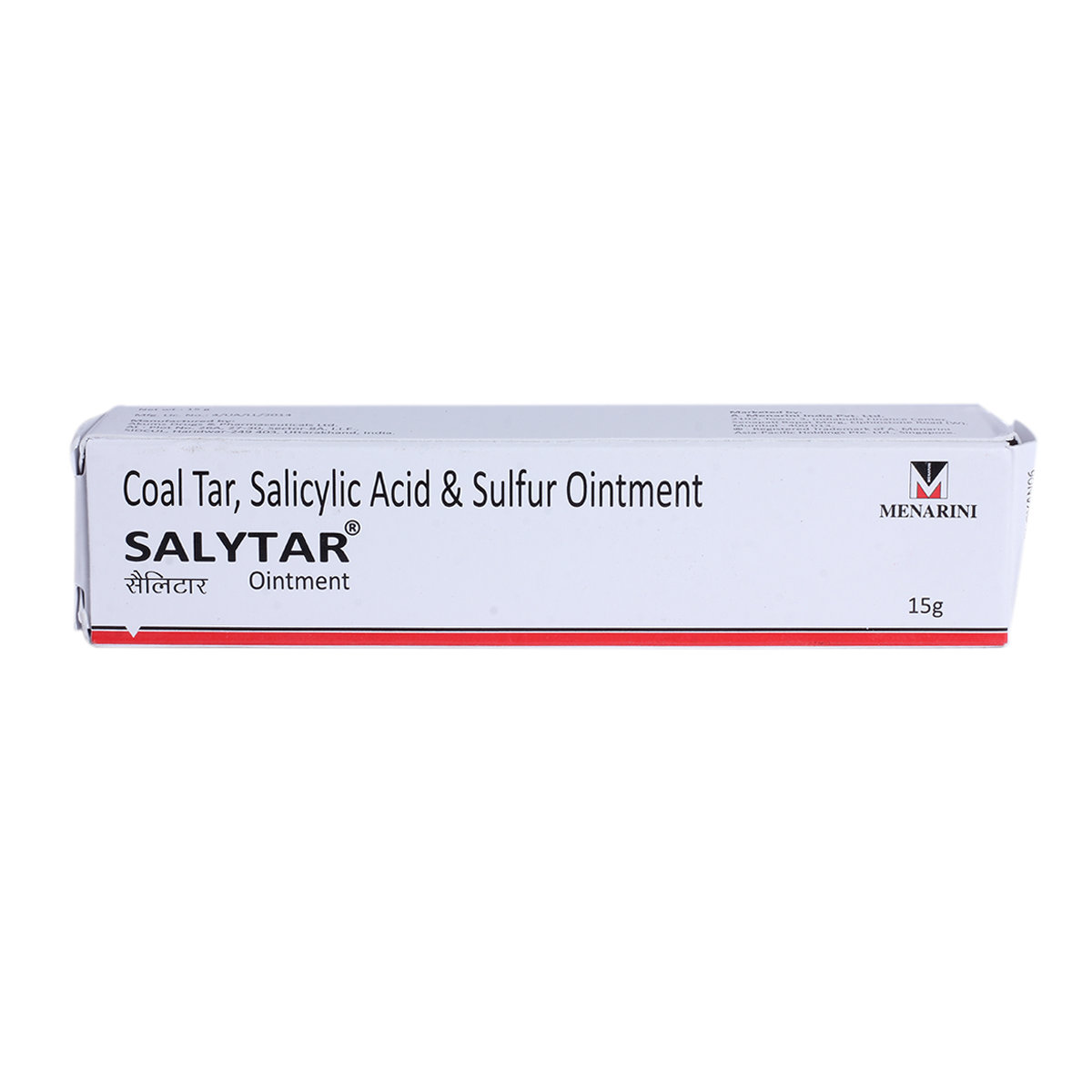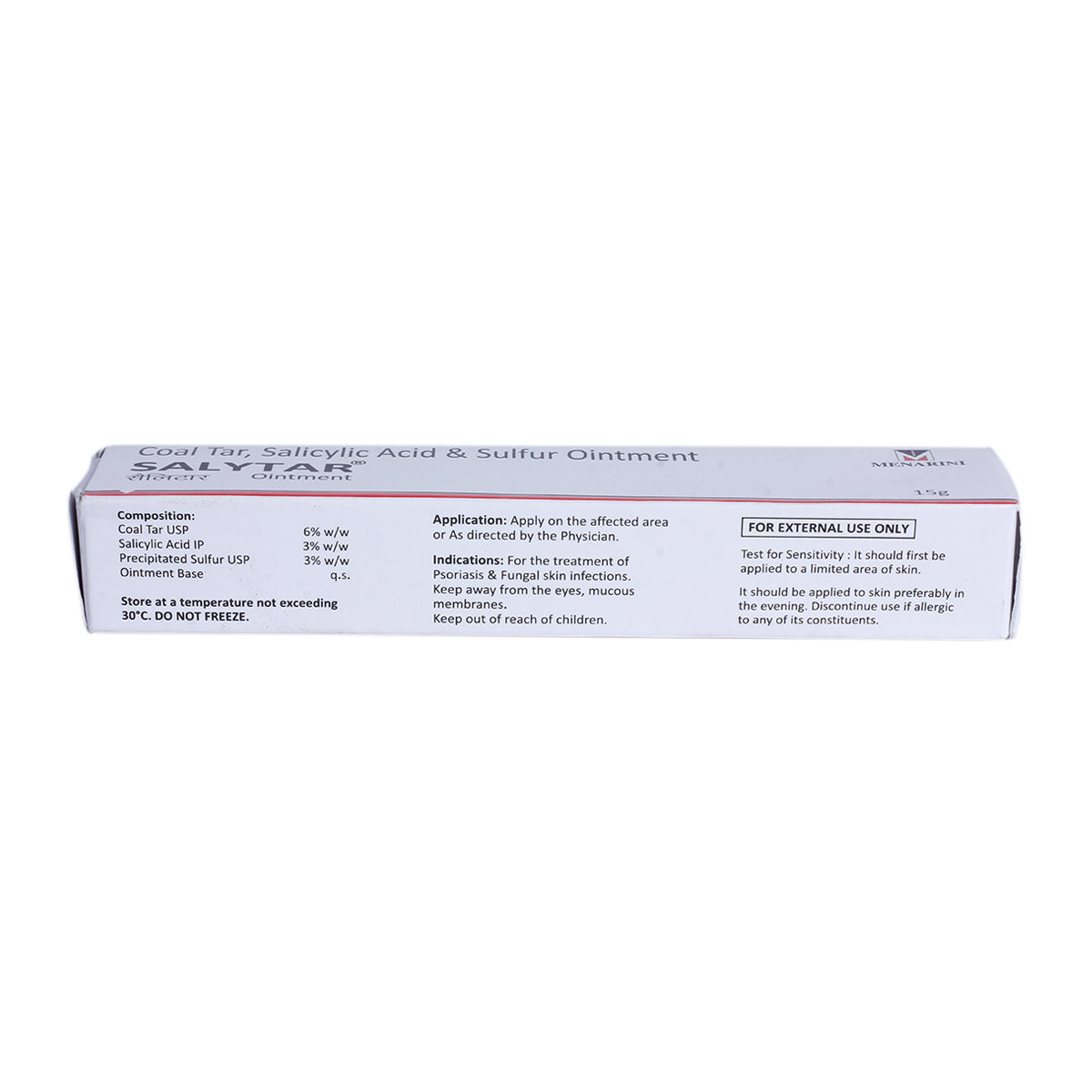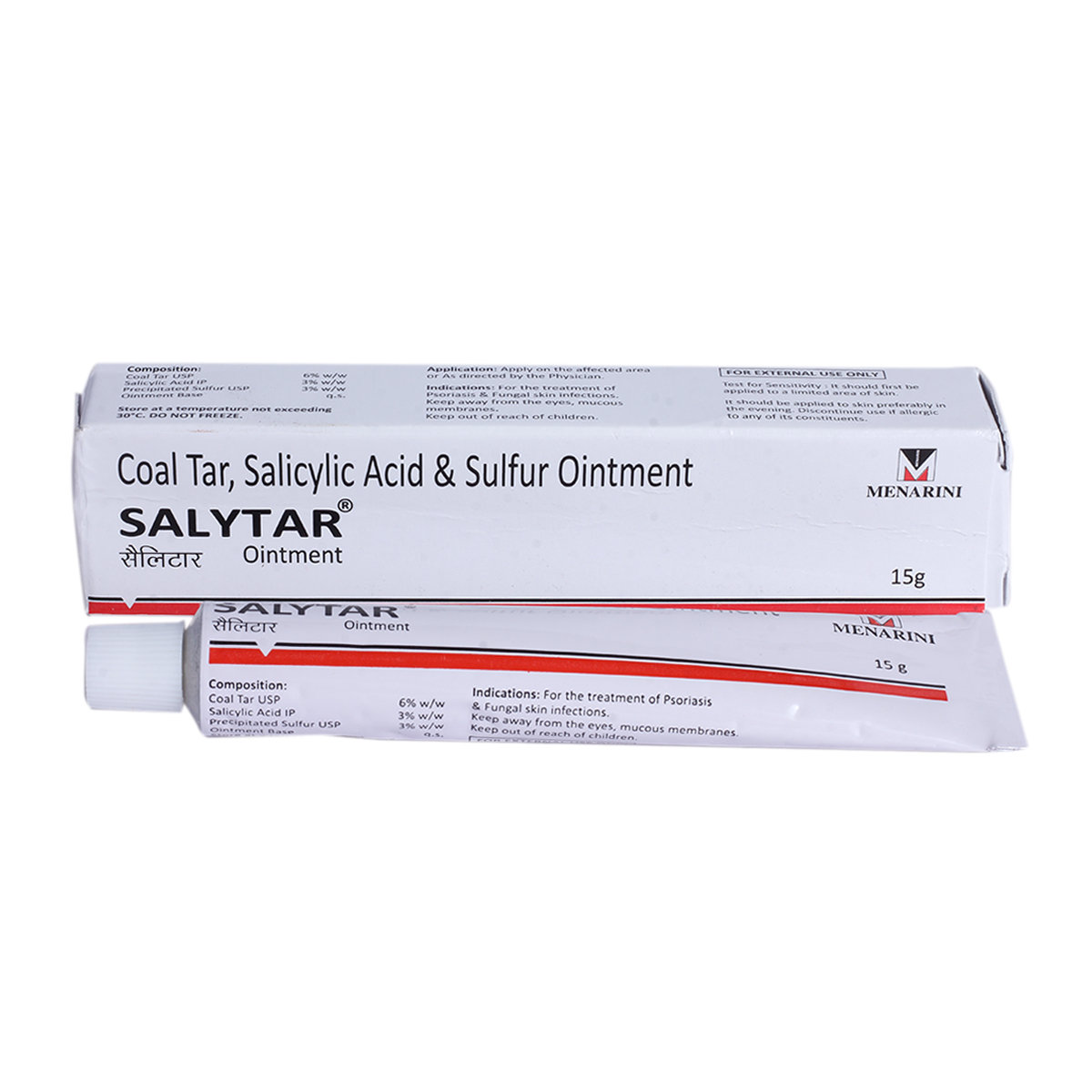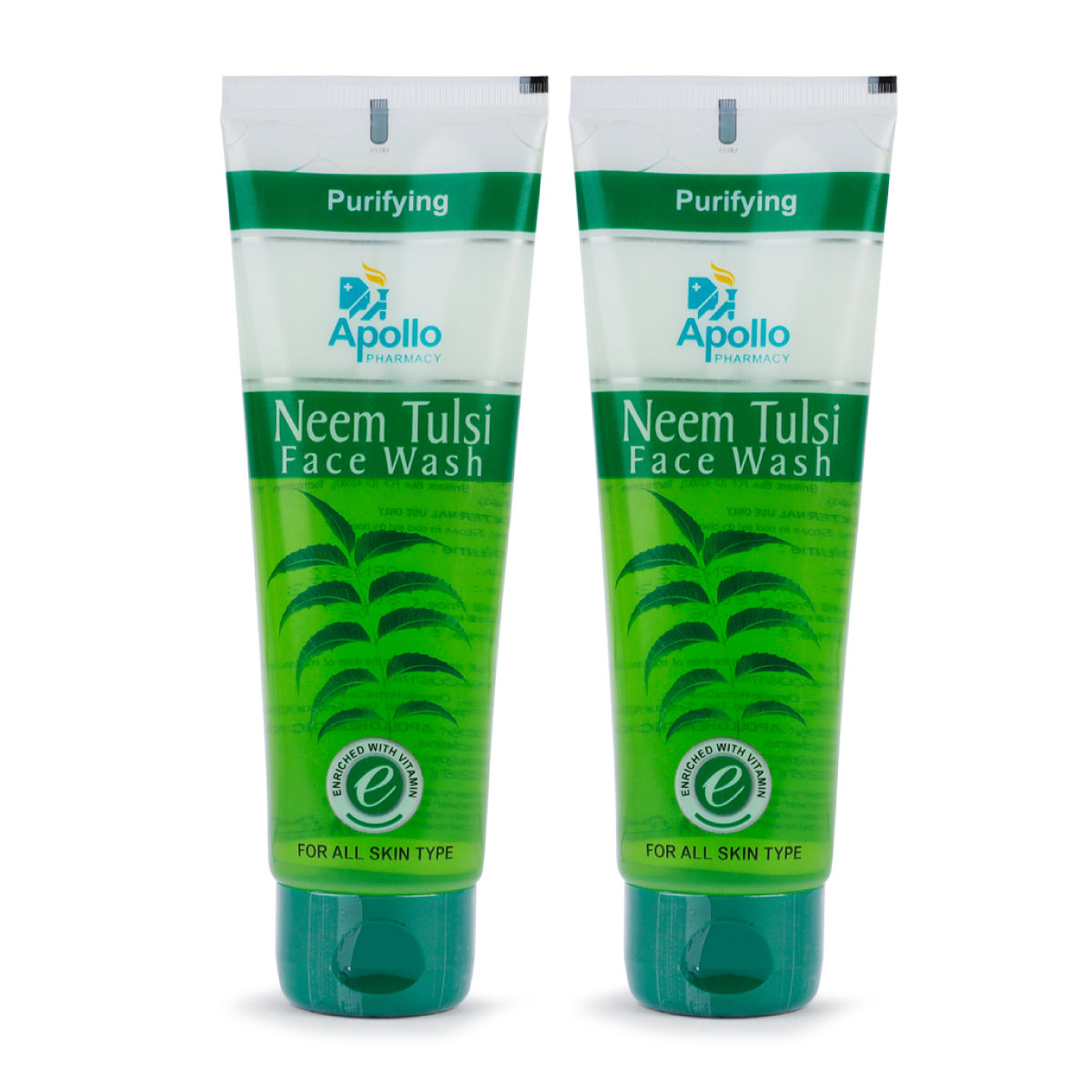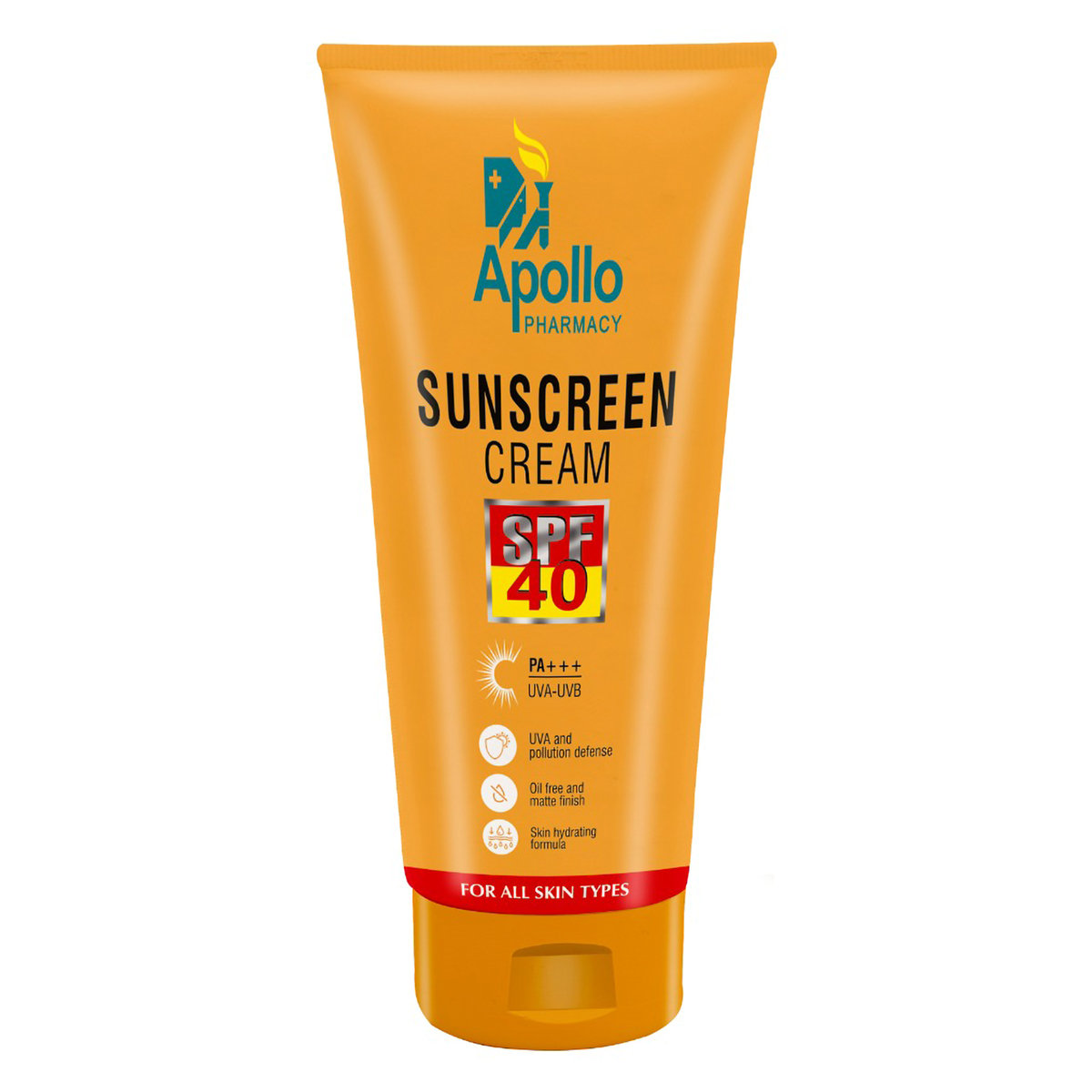Salytar Ointment 15 gm
MRP ₹63.5
(Inclusive of all Taxes)
₹9.5 Cashback (15%)
About Salytar Ointment
Salytar Ointment is a dermatological medication used to treat and control skin conditions like psoriasis of the scalp, dandruff, and seborrheic dermatitis (scaly patches and red skin on the scalp). Psoriasis is a skin disorder in which skin cells multiply up to 10 times faster than usual, leading to skin build-up into bumpy (uneven) red patches covered with white scales. These commonly appear on the scalp, elbows, knees, and lower back.
Salytar Ointment is composed of: Salicylic acid (peeling agent), Coal tar, and Sulphur. Salicylic acid is a keratolytic medicine (softens, separates, and causes desquamation (peeling) of the cornified epithelium or horny layer of skin). It increases the amount of moisture in the skin and dissolves the substance that causes the skin cells to stick together. It breaks down the clumps of keratin, removes dead skin cells, and softens the skin. Coal tar is a keratoplastic (thickens the keratin layers) agent. It works by removing dead cells from the skin’s top layer and slowing down skin cells' growth. This effect decreases scaling and dryness, thus relieving itchiness from various skin conditions. Sulphur is an antiseptic agent and relieves itching. It also has an antifungal action and promotes the shedding of the skin.
Salytar Ointment is for topical (for skin use) only. Salytar Ointment has common side effects like warmth or a burning sensation, skin irritation, hair loss, acne-like eruptions, peeling of the skin, itching, and redness at the application site. The burning sensation may usually last for five minutes after application. These side effects of Salytar Ointment do not require medical attention and gradually resolve over time. However, if these side effects persist longer, please consult your doctor.
Let your doctor know if you have any allergic reactions to Salytar Ointment or other medications. Do not put a dressing or bandage on the affected area unless the doctor advises doing so. Please check with your doctor before using Salytar Ointment if you have kidney, liver diseases, folliculitis (inflammation of hair follicles), broken or infected skin, and other skin infections. Pregnant and breastfeeding mothers should consult the doctor before starting Salytar Ointment.
Country of origin
Manufacturer/Marketer address
Online payment accepted

secured payment

india's most trusted pharmacy

genuine products
Composition :
Manufacturer/Marketer :
Consume Type :
Expires on or after :
Return Policy :
Provide Delivery Location
About Salytar Ointment
Salytar Ointment is a dermatological medication used to treat and control skin conditions like psoriasis of the scalp, dandruff, and seborrheic dermatitis (scaly patches and red skin on the scalp). Psoriasis is a skin disorder in which skin cells multiply up to 10 times faster than usual, leading to skin build-up into bumpy (uneven) red patches covered with white scales. These commonly appear on the scalp, elbows, knees, and lower back.
Salytar Ointment is composed of: Salicylic acid (peeling agent), Coal tar, and Sulphur. Salicylic acid is a keratolytic medicine (softens, separates, and causes desquamation (peeling) of the cornified epithelium or horny layer of skin). It increases the amount of moisture in the skin and dissolves the substance that causes the skin cells to stick together. It breaks down the clumps of keratin, removes dead skin cells, and softens the skin. Coal tar is a keratoplastic (thickens the keratin layers) agent. It works by removing dead cells from the skin’s top layer and slowing down skin cells' growth. This effect decreases scaling and dryness, thus relieving itchiness from various skin conditions. Sulphur is an antiseptic agent and relieves itching. It also has an antifungal action and promotes the shedding of the skin.
Salytar Ointment is for topical (for skin use) only. Salytar Ointment has common side effects like warmth or a burning sensation, skin irritation, hair loss, acne-like eruptions, peeling of the skin, itching, and redness at the application site. The burning sensation may usually last for five minutes after application. These side effects of Salytar Ointment do not require medical attention and gradually resolve over time. However, if these side effects persist longer, please consult your doctor.
Let your doctor know if you have any allergic reactions to Salytar Ointment or other medications. Do not put a dressing or bandage on the affected area unless the doctor advises doing so. Please check with your doctor before using Salytar Ointment if you have kidney, liver diseases, folliculitis (inflammation of hair follicles), broken or infected skin, and other skin infections. Pregnant and breastfeeding mothers should consult the doctor before starting Salytar Ointment.
Uses of Salytar Ointment
Key Benefits
Salytar Ointment consists of Salicylic acid, Coal tar, and Sulphur. It is used to treat psoriasis of the scalp, dandruff, and controls seborrheic dermatitis. Salicylic acid is a keratolytic medicine that increases the amount of moisture in the skin and dissolves the substance that causes the skin cells to stick together. It breaks down the clumps of keratin, removes dead skin cells, and softens the skin. It is also an anti-inflammatory agent and topical antibacterial agent. Coal tar is a keratoplastic (thickens the keratin layers) agent that causes the shedding of dead cells from the skin’s top layer and slows down the growth of skin cells. This effect decreases scaling and dryness and relieves itchiness. Sulphur is an antiseptic agent and relieves itching. It also has an antifungal action and promotes shedding of the skin. Salytar Ointment also reduces the hardening, thickening, and scaling of the skin.
Directions for Use
Storage
Side Effects of Salytar Ointment
- Burning sensation
- Skin irritation
- Itching
- Redness at the application site
- Hair loss
- Acne-like eruptions
- Peeling of the skin
Drug Warnings
Before using Salytar Ointment, inform your doctor know if you have a history of kidney and liver diseases, folliculitis (inflammation of hair follicles), broken or infected skin, other skin infections, and allergic reactions to Salytar Ointment and other medicines. Do not put a dressing or bandage on the affected area unless the doctor advised doing so. Do not go near naked flames since the fabric that comes in contact with Salytar Ointment may burn easily. Washing the fabric may decrease the risk, but it does not remove the product completely. Salytar Ointment may stain fingernails, hair, and skin; hence, please take proper precautions during application. It is recommended to avoid tanning booths and sunlamps since Salytar Ointment may make your skin sensitive to light. Let your doctor know if you plan to become pregnant or already pregnant and a lactating mother before using Salytar Ointment.
Drug Interactions
Drug-Drug Interaction: Salytar Ointment may interact with other dermatological medicines (adapalene, alitretinoin, bexarotene, isotretinoin, tazarotene, tretinoin, methyl aminolevulinate, aminolevulinic acid, and trifarotene), and psoriasis treating drugs (methoxsalen).
Drug-Food Interaction: No drug-food interactions found/ established.
Drug-Disease Interaction: Brief your doctor if you have a medical history of kidney and liver diseases, folliculitis, broken or infected skin, other skin infections, and allergic reactions.
Drug-Drug Interactions Checker List
- ADAPALENE
- ALITRETINOIN
- BEXAROTENE
- ISOTRETINOIN
- TAZAROTENE
- TRETINOIN
- METHYL AMINOLEVULINATE
- AMINOLEVULINIC ACID
- TRIFAROTENE
- METHOXSALEN
Habit Forming
Diet & Lifestyle Advise
- Use mild soap while taking baths and prefer warm baths.
- Always wear loose-fitting clothes to avoid further sweat and spread of the infection.
- Regularly change your socks and wash your feet. Avoid shoes that make your feet sweaty and hot.
- Do not walk barefoot at places like gym showers to prevent infections.
- Do not scratch the affected area of the skin as it can spread the infection to other body parts.
- Avoid sharing towels, combs, bed sheets, shoes, or socks with others.
- Wash your bed sheets and towels regularly.
- Avoid or limit the intake of alcohol and caffeine.
- Do not scratch or pick your skin to avoid getting the affected area infected.
- Manage stress, eat healthily, drink plenty of water, exercise regularly, and sleep peacefully.
Special Advise
It is advised to reach out to your doctor if the infection symptoms persist or worsen after two weeks of treatment.
Disease/Condition Glossary
Psoriasis: It is a skin disorder in which skin cells multiply up to 10 times faster than usual, leading to skin build-up into bumpy (uneven) red patches covered with white scales. These most commonly appear on the scalp, elbows, knees, and lower back.
Dandruff: It is a condition that causes the scalp's skin to form dry and white flakes.
Seborrheic dermatitis: It is a skin disease that causes scaly patches and red skin, mainly on the scalp. It can cause stubborn dandruff.
FAQs
Disclaimer
Alcohol
Safe if prescribed
No interaction found/ established. Please consult your doctor before using Salytar Ointment.
Pregnancy
Consult your doctor
It is not known if Salytar Ointment affects pregnancy. Please consult your doctor if you are planning to become pregnant or already pregnant before starting Salytar Ointment.
Breast Feeding
Consult your doctor
There is limited data on how Salytar Ointment affects breastfeeding. Please consult your doctor before starting Salytar Ointment.
Driving
Safe if prescribed
Salytar Ointment has negligible influence on the ability to drive or use machines.
Liver
Consult your doctor
Let your doctor know if you have any history of liver diseases or hepatic impairment. Your doctor will weigh the benefits and potential risks before recommending Salytar Ointment.
Kidney
Consult your doctor
Let your doctor know if you have any history of kidney diseases before using Salytar Ointment.
Children
Safe if prescribed
Salytar Ointment is to be used on children of 6-12 years of age only when advised by the doctor. It is not recommended below six years of age.
Author Details
We provide you with authentic, trustworthy and relevant information
Reference
- https://www.drugs.com/cdi/coal-tar-salicylic-acid-and-sulfur.html
- https://www.drugs.com/mtm/salicylic-acid-topical.html
- https://www.drugs.com/mtm/coal-tar-topical.html
- http://www.hpra.ie/img/uploaded/swedocuments/13c7ffca-8d05-4494-b874-0b931d8d0303.pdf
- https://www.webmd.com/drugs/2/drug-4183-1056/coal-tar-topical/coal-tar-topical/details
- https://www.webmd.com/drugs/2/drug-18-866/salicylic-acid-topical/salicylic-acid-keratolytic-topical/details
Uses of Salytar Ointment
Key Benefits
Salytar Ointment consists of Salicylic acid, Coal tar, and Sulphur. It is used to treat psoriasis of the scalp, dandruff, and controls seborrheic dermatitis. Salicylic acid is a keratolytic medicine that increases the amount of moisture in the skin and dissolves the substance that causes the skin cells to stick together. It breaks down the clumps of keratin, removes dead skin cells, and softens the skin. It is also an anti-inflammatory agent and topical antibacterial agent. Coal tar is a keratoplastic (thickens the keratin layers) agent that causes the shedding of dead cells from the skin’s top layer and slows down the growth of skin cells. This effect decreases scaling and dryness and relieves itchiness. Sulphur is an antiseptic agent and relieves itching. It also has an antifungal action and promotes shedding of the skin. Salytar Ointment also reduces the hardening, thickening, and scaling of the skin.
Directions for Use
Storage
Drug Warnings
Before using Salytar Ointment, inform your doctor know if you have a history of kidney and liver diseases, folliculitis (inflammation of hair follicles), broken or infected skin, other skin infections, and allergic reactions to Salytar Ointment and other medicines. Do not put a dressing or bandage on the affected area unless the doctor advised doing so. Do not go near naked flames since the fabric that comes in contact with Salytar Ointment may burn easily. Washing the fabric may decrease the risk, but it does not remove the product completely. Salytar Ointment may stain fingernails, hair, and skin; hence, please take proper precautions during application. It is recommended to avoid tanning booths and sunlamps since Salytar Ointment may make your skin sensitive to light. Let your doctor know if you plan to become pregnant or already pregnant and a lactating mother before using Salytar Ointment.
Therapeutic Class
Drug-Drug Interactions
Drug-Drug Interactions
Login/Sign Up
Drug-Drug Interactions Checker List
- ADAPALENE
- ALITRETINOIN
- BEXAROTENE
- ISOTRETINOIN
- TAZAROTENE
- TRETINOIN
- METHYL AMINOLEVULINATE
- AMINOLEVULINIC ACID
- TRIFAROTENE
- METHOXSALEN
Diet & Lifestyle Advise
- Use mild soap while taking baths and prefer warm baths.
- Always wear loose-fitting clothes to avoid further sweat and spread of the infection.
- Regularly change your socks and wash your feet. Avoid shoes that make your feet sweaty and hot.
- Do not walk barefoot at places like gym showers to prevent infections.
- Do not scratch the affected area of the skin as it can spread the infection to other body parts.
- Avoid sharing towels, combs, bed sheets, shoes, or socks with others.
- Wash your bed sheets and towels regularly.
- Avoid or limit the intake of alcohol and caffeine.
- Do not scratch or pick your skin to avoid getting the affected area infected.
- Manage stress, eat healthily, drink plenty of water, exercise regularly, and sleep peacefully.
Habit Forming
Side Effects of Salytar Ointment
- Burning sensation
- Skin irritation
- Itching
- Redness at the application site
- Hair loss
- Acne-like eruptions
- Peeling of the skin
Special Advise
It is advised to reach out to your doctor if the infection symptoms persist or worsen after two weeks of treatment.
Disease/Condition Glossary
Psoriasis: It is a skin disorder in which skin cells multiply up to 10 times faster than usual, leading to skin build-up into bumpy (uneven) red patches covered with white scales. These most commonly appear on the scalp, elbows, knees, and lower back.
Dandruff: It is a condition that causes the scalp's skin to form dry and white flakes.
Seborrheic dermatitis: It is a skin disease that causes scaly patches and red skin, mainly on the scalp. It can cause stubborn dandruff.
All Substitutes & Brand Comparisons

Have a query?

